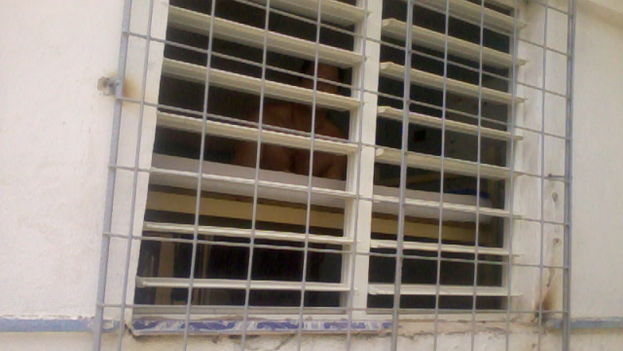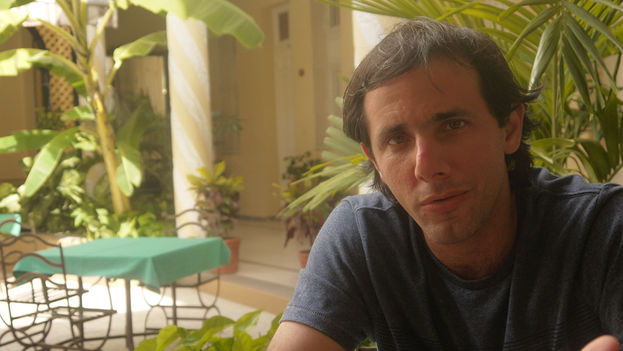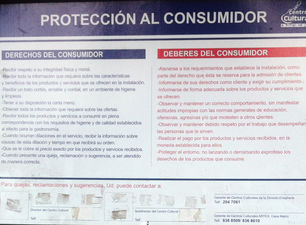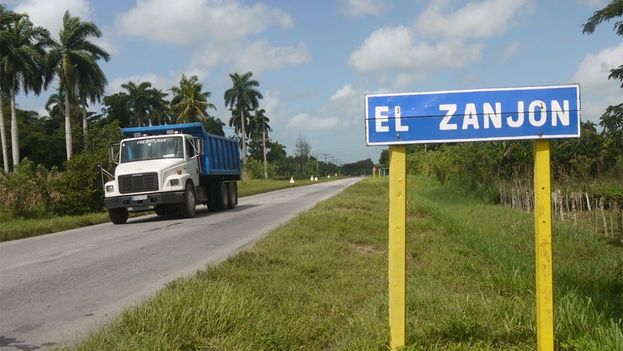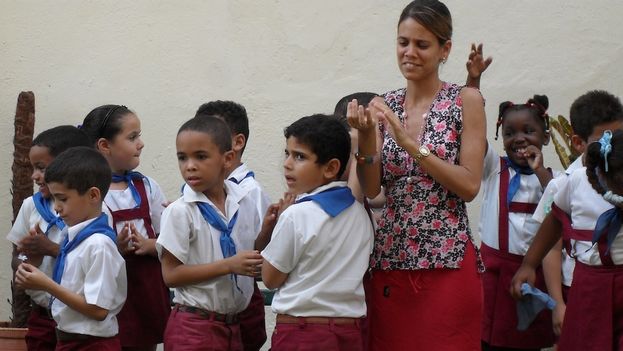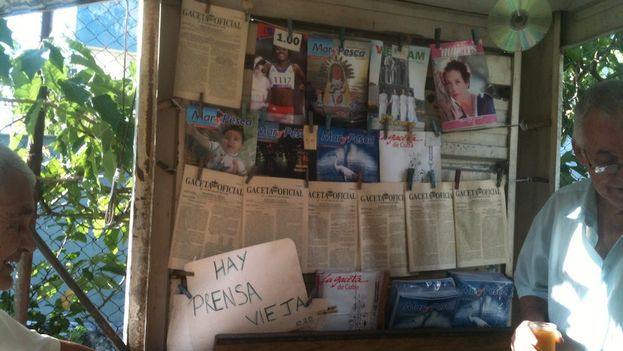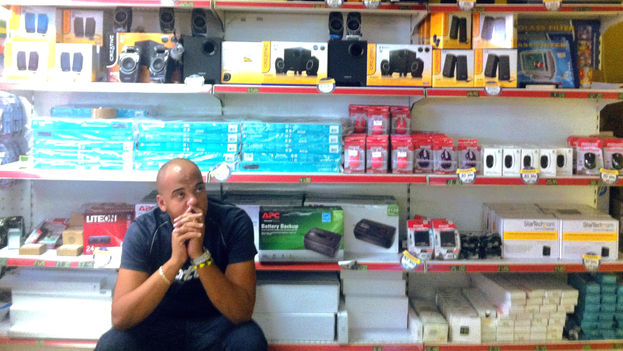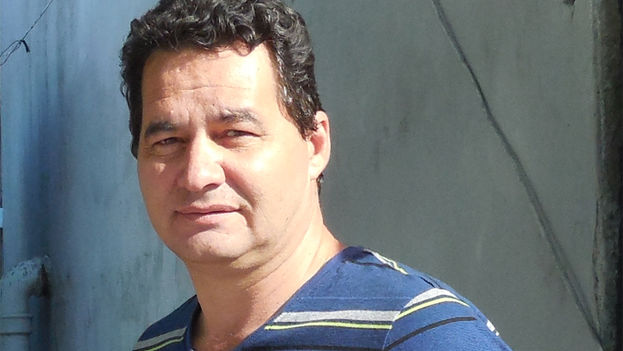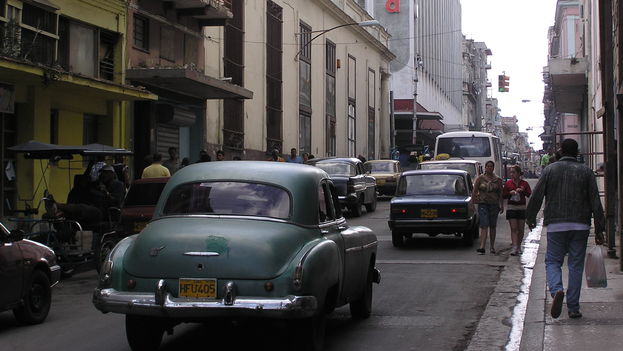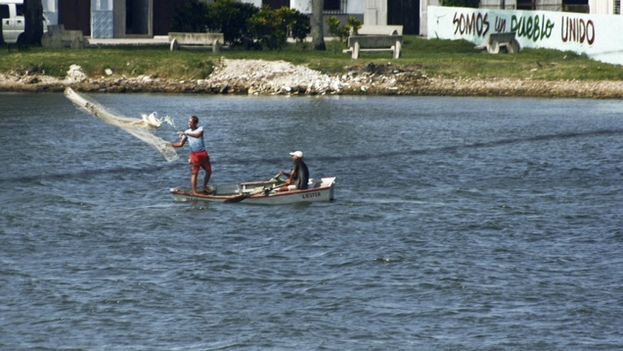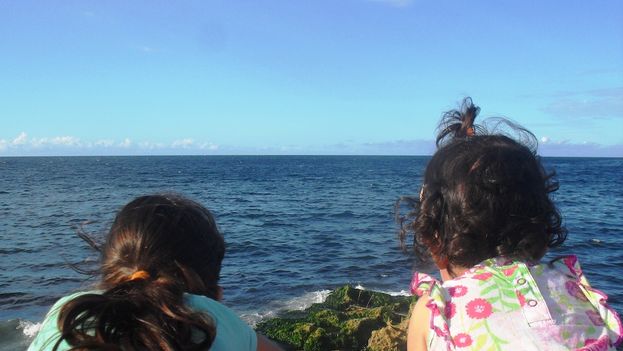14ymedio, Miriam Celaya, Havana, 23 August 2014 — “Beds, furniture, mattresses, heaters”, is the soft cry from a reseller who prowls around the Carlos III Market entranceway. A few steps away, another dealer advertises his wares: “airs,’microgüeys’, washing machines, rice cookers, ‘Reina’ brand pots and pans…” The cries are not too loud, but measured, uttered in a tone just loud enough to reach the ears of the nearby walkers, or of those people who enter or leave the market.
Speculators move around with stealth and pretending, like one who knows well that he is operating at the margin of what is legal. So, as soon as he sees a cop or some individual he suspects of being an “inspector”, the cries are abruptly suspended. Many turn away instantly, but the more adventurous stay and buy themselves a beer and adopt the carefree air of one who just wants to cool off from the heat wave of this merciless August air. They know they don’t fool anyone, but neither can they be charged with a crime if they are not caught dealing in the illegal market.
For years, black market traders have flourished all around shops operating in foreign currencies. They speculate in several different products, from sophisticated electronics equipment to cosmetics or toothpaste. They come in quite a few categories, depending on the product they sell, but all belong to this illegal trade network that is many times more efficient than the legal markets: the chain formed by hoarders and/or burglars-resellers-receivers. There is currently an official media campaign being developed against the first two links (hoarders-resellers).Government media particularly blame those who traffic in products that are scarce, while shortages–another epidemic that has turned endemic–affect the country’s commercial trading networks. continue reading
Speculation, an evil concomitant with a society marked by material shortages of all kind.
This crusade against corruption and illegal activities, however, does not stand out for “uncorking” before public opinion the obvious problem of speculation, a concomitant evil to the system, and fitting to a society scored by material shortages of all kinds. In fact, this type of crime is nothing new, but just the opposite: we could almost state that there isn’t a “pure” Cuban who is able to survive outside of illicit trading in any of its many forms.
Thus in Cuba there is currently an unwritten law: those who do not steal at least receive stolen products. A situation that is based on the failure of the social project built on an economy that is fictitious and eternally dependent on external subsidies.
However, the official media not only points an accusing finger at the usual dealers, among which are common criminals, lazy opportunists, thugs of all kinds, thieves by vocation, and other specimens classified as social stigmas anywhere in the world but that proliferate with impunity and force in economically and morally deformed societies.
The immaculate criers of the regime also accuse of being “hoarders and resellers” those traders in the abused sector of “the self-employed” who take advantage of the shortage to profit from the sale of items previously purchased from retail networks, often by agreement with corrupt managers or employees. The self-employed are now the blackbirds [the weather] that everything gets blamed on, as were the “Free Market” farmers of the distant 80’s, and later, in the bloody Special Period of the 90’s, artisans and Cathedral Square vendors, the first outposts of self-employment.
Official reporters, in their poignant candor, attribute store shortages to speculators and not to the State Government, owner of all commercial chains and responsible for keeping them supplied. In their way of thinking it doesn’t appear that the old and effective correlation between supply and demand exists, in virtue of which speculation would not be possible, as long as the commercial network supply is maintained. That is why certain products, such as rum and cigars produced domestically are not part of the black market: all the shops are overflowing with them.
In fairness, we must recognize that rampant speculation exists in Cuba, and that this phenomenon greatly affects everyone’s pockets, but to harshly focus blame onto its effects without aiming at its source is redundant and a discredit to the accuser. It turns out that the biggest culprit is absent from the bench of such severe judgment.
If there is any hoarder in whose hands the whole of the market concentrates, it’s the State monopoly.
Because, if there is a hoarder in whose hands the whole market, trade, prices and distribution of each product is concentrated, it’s the state monopoly, controlled by the ruling elite and its closest acolytes. If there is a reseller with a capital “R” it’s the very elite in power that buys at bargain prices all kinds of cheap merchandise that it later resells “legally” at astronomical prices.
We should not ignore in this story memories of other hoarding on the part of the government, the adjudication of approximately 70% of all of the country’s arable land, of the National Bank; of all industries; hotels and housing infrastructures; of the best mansions and spaces for their benefit and for the benefit of their caste and followers, among others which we will omit so we won’t impose on the readers’ patience.
The philosophy of poverty as “virtue”
While the black market has expanded and specialized in the last 25 years, the truth is that it has coexisted with this system almost from the start, turning each Cuban into a true or potential violator of the law.
The poverty that the triumph of the revolution would supposedly end, in practice not only became widespread, but also systematized and institutionalized to the point that today Cuba holds the sad record of being the only country in the world that has maintained a ration card–a mechanism of war economy–for over 50 years, which has planted in the consciousness of several generations an effect of disability and dependence culminating in a detachment from the law which establishes permanent hardship as morality.
Dealers, instead of being perceived as criminals, are transmuted into benefactors, since they rob the rich (the Government-State), to benefit ordinary Cubans
This phenomenon has penetrated into the national psyche so deeply that we don’t even perceive the harm in all its magnitude, so the solution for necessities becomes legitimate regardless of the method used for this. For example, for an average Cuban, the purchase of one kilogram of powdered milk on the black market at 80 pesos seems legitimate, since it ensures her 7 year-old kid’s breakfast–who is thus stripped of her right to acquire the same product on the ration card–since the cost on the legal market for the same amount is 160 pesos, twice the amount as in the black market.
Thus, a new “Robin Hood syndrome” has been established in Cuban society, such that the reseller or trafficking dealer, instead of being perceived as a criminal, is transmuted into a benefactor, since he is stealing from the rich (the government-state) in order to benefit, in some measure, the poor (the common Cuban), given that his prices, though high and out of the reach of the poorest, are less onerous than those of the state monopoly. At any rate, as the old saying goes, “a thief who steals from a thief gets a hundred years’ pardon”.
An unbreakable chain?
However, the chain of hoarding-speculation-receiving, as well as its effects on the economy, and even on social morality, is not unbreakable. Freeing the market and allowing normal operation of its laws would be sufficient, or releasing a portion of that market, so that traders would no longer be the evil that the government hypocritically seeks to protect us from, to have it become an important sector for healing the domestic economy. In short, the story of the last few decades offers an unquestionable lesson: there has never, ever been a central economy that has survived this logic.
Another useful measure would be to maintain a permanent and satisfactory level of supply and prices commensurate with incomes, but the impossibility of this option has already been demonstrated. Meanwhile, the same government that decries illicit small merchants legitimizes its own speculation at the expense of a country that belongs to all. At the end of the day, the root of the evil resides in the perverse nature of the politics of a group that has accumulated too much power for too much time. In Cuba, the truth is redundant.
Translated by Norma Whiting
